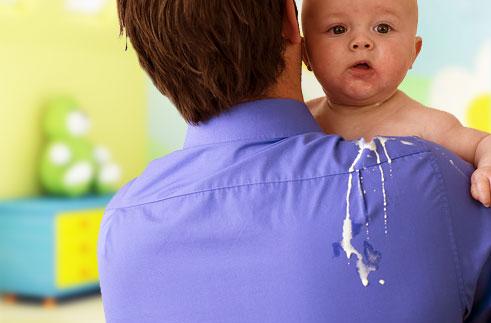Baby Vomiting:
7 Reasons Why She's Pouring It All Out!
If you are a mom like me, the shocking sight of your baby vomiting - that sudden thrust of weird looking and weirder smelling white fountain right out of your little one's mouth - triggers 2 questions and 1 sigh (with the speed of light).
A) Why did this happen?
B) How can I treat this?
C) More clothes to wash and carpet to scrub! *sigh* (yep, this was the sigh part!)
Sounds familiar?
Let me sort out the two questions first and we can then go to the sigh part!
If
you are worried about your baby throwing up, you are not alone. Every parent
experiences this dreadful time at some point in his/her life.
Cause & Cure of Baby Vomiting
The sight of your baby vomiting is no doubt a disheartening experience. What could be the reason for this agony? Is it a simple thing, like milk coming out because you forgot to burp your sweet-pea or perhaps you have absolutely no idea why your baby is vomiting. The later part can raise even more cause for concern.
What makes a baby vomit?
Knowing the possible causes of baby vomiting can help you be prepared to handle it appropriately. Even if you expect your newborn to vomit for some reason or another (for example, if he is suffering from diarrhea, fever, stomach upset due to gas or newborn acid reflux, etc) it is also a good idea to know what to do when vomiting occurs.
Baby vomiting can occur due to the following reasons. Every reason has its own way of treatment that is mentioned in the respective sections. Check out these 7 reasons why your little one is pouring it all out:
1. Digestive system is adjusting.
Your newborn was living in the cosy womb, and then he had to come out. Hence, his tiny tummy needs to adjust to the life outside the mommy. One cause of baby vomiting could be an attempt for your newborn’s digestive system to try to adjust to its new environment outside the womb. This may be more common if your newborn is bottle-fed.
When your baby was born, adjustments began in your infant’s digestive system in an effort to adapt to the new type of sustenance it was beginning to receive. Some newborns handle this change better than others. However, if your baby is vomiting after every feeding session, it is possible that his little tummy is still trying to adjust.
2. Your baby is drinking milk too fast ... *gulp gulp*
If you think your baby can win the fastest bottle finishing contest, the trophy might be too heavy for the little stomach to carry. What this means is that if your baby gulps down the milk (bottle feeding or breastfeeding) quickly; or the nipple of his feeding bottle has more holes than it should have at this stage; the milk will come out of it at a faster pace when your hungry baby sucks it. Also, this may occur if your little one intakes his pureed food (in case he is older than 6 months) really fast.
Result: The milk or pureed food passes down from the mouth into the stomach area at a pace which is faster than it should be. This can cause significant pockets of air to be swallowed along with the milk. The air bubbles then gradually grow into huge air pockets and eventually try to push the food right back out of the stomach.
The discomfort that your baby feels when these air pockets reside in the stomach can generate an uncontrollable regurgitation action which pushes food upwards. Due to the force of the air pockets, the food that is vomited appears to be thrown forcefully out of the mouth...not to mention it ends up leaving a memorable stain on the carpet!
3. Burping is very important ...*burp*
Ask any new parent about their favorite sound and the answer would be a burp!
*burrrrp*
A newborn burping sound is no doubt one of the most satisfying sounds a mother would want to hear. And is rightly so. A burp is considered a blessing as it ensures the mother that the milk your newborn just took won't come out. (*fingers crossed*)
So, your newborn may have vomited because she was not burped after the feeding. Even if minimal amount of air is swallowed by your newborn, correct burping techniques can be used to help remove such pockets of air. This helps to keep the milk inside your newborn’s stomach. Parents and caregivers should regularly burp their babies and once this action becomes a habit, the chances of vomiting after feeding can be greatly reduced.
4. Food that the little stomach cannot handle...
Too eager to make your little one taste mommy's first-ever homemade baby puree? Or do you want to test the chewing capabilities of those cute pair of teeth that emerged last Thursday?
Your anxiousness to make those tiny taste-buds taste something that's not milk and not white is understandable. However, if you don't wait for the right time and the little tummy is not ready, you may end up getting yourself a surprise vomit!
If your baby is 4 months or older and has started solids, there may be foods that should have been pureed, chopped or made into
a baby-friendly portion before serving these items to your baby. Failure to provide appropriate food sizes and portions for your baby can result in vomiting. This is because your baby’s stomach cannot process inappropriate food. Hence, the only way to get the food out is to push it back up through the mouth. Usually as the food remains in the stomach, your baby can feel acute discomfort. However, this discomfort is relieved as soon as vomiting occurs. (Then, this discomfort is shifted towards your side - calling the doctor, and cleaning the vomit!)
5. Your baby might be suffering from some other illness.
A fifth reason for vomiting is due to illness or some other case of stress that your baby might be experiencing. If your baby has a fever or is suffering from another illness, vomiting may be the way that your baby’s body protests and tries to regulate itself. In many cases, vomiting may not continue after a day.
However, if vomiting does continue and seems to be having an adverse effect on your baby, you should seek medical attention immediately. In case of babies that are six months plus, apart from medicines there are specific items and foods that your doctor may prescribe that you give your baby after vomiting episodes such as fluids, bananas and yogurt.
Baby vomiting also takes place in case of colic when your newborn cries till she vomits out all the milk she has taken in. For more information on colic, read our article on newborn colic here. Whatever the reason is for baby vomiting, make sure you keep her well-hydrated to retain the useful electrolytes in her body.
6. Newborn Acid Reflux
One of the reasons why a newborn may throw up his milk every time he intakes it might be due to Newborn Acid Reflux. To know all about it, click here to read our article on newborn acid reflux.
7. Galactosemia
Another medical condition, known as Galactosemia, also causes a newborn baby to vomit out the milk he intakes. This is because Galactosemia is a serious condition that causes milk intolerance (breast milk or formula milk). Refer to our highly informative article on Galactosemia.
You may find your newborn baby vomiting due to any one of the reasons mentioned above. It is important to know the cause of the vomit - only then can you provide your little munchkin relief.
The Aftershocks! *scrub scrub*
So, I have addressed the two questions and now come the Sigh part! I'm glad you are hanging on this tight to know more about how to clean in an effective way - which I normally refer to as the aftershocks of a baby vomit!
In this section I am going to give you few handy tips which are very effective - tried and tested for generations...err, by that I mean my mom passed 'em on to me! ;-)
- Clean the affected carpet, sofa or mattress immediately. The longer the vomit sits on it, the more will it soak into the fibers and hence would be more difficult to remove.
- Cover the affected area with baking soda or corn starch. Either of these will soak up the excess moisture. Allow them 10-15
minutes to soak to their fullest capacity. Then vacuum away the baking soda (or corn starch).
- Whatever washing liquid or powder you use, make sure you finish the cleaning with a wipe of vinegar. It is an excellent antibacterial agent that makes the smell go away too. Alternately, you can always go for Dettol or any other antiseptic and disinfectant.
- Don't throw away used toothbrushes and old (absorbent) T-shirts; as in vomiting crisis, you can always use them to scrub, clean and can then throw 'em away!
What you can do to avoid some types of baby vomiting is to make sure you take extra care of your baby's hygiene, and always burp after every feed. Furthermore, if you swaddle your newborn, make sure it's not too tight - same goes for his clothes.
A healthy baby is a happy baby; and a happy baby is a happy you!
Return to Health section, or to Baby Care section.
Return from Baby Vomiting to Homepage.





New! Comments
Have something to say about what you just read? Leave me a comment in the box below :)